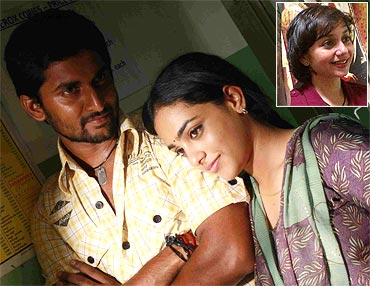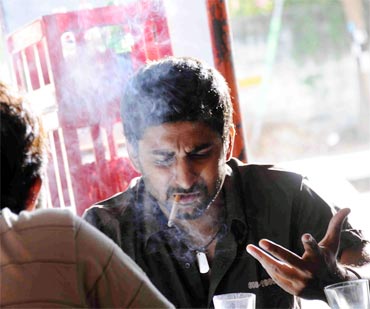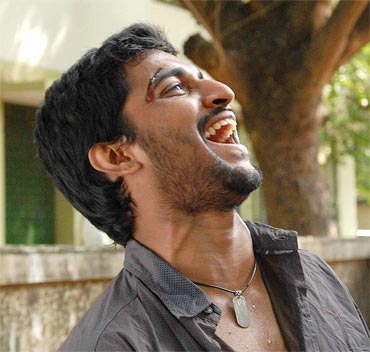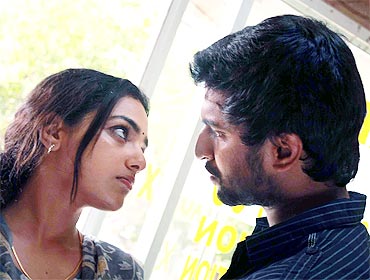 | « Back to article | Print this article |
'Veppam is a realistic take on city life'
Armed with a university gold medal, Anjana Ali Khan went into advertising as a copy writer, transitioned to making ad films, started her production house in 1997 and made lots of television commercials, music videos and corporate documentaries, some of which won awards.
When she felt that she wanted to tell a longer story, her struggle started. It took her seven years to make her first feature film, Veppam, in Tamil. During this period, she worked with Gautham Vasudev Menon on his film Vettaiyaadu Vilayaadu, as an associate director.
In this interview, Anjana gives Radhika Rajamani some insights into Veppam, which releases this Friday.
Why did you decide to make Veppam?
I wanted to make a film that would appeal to the widest cross-section of audience and stand out from the clutter. I wanted to do it on a tight scale to prove that you do not necessarily need to spend massive amounts of money in order to make a decent film.
How long did it take to script this story?
I worked on the script for a few months. I have a bank of several bound scripts but I decided to work on this fresh one for my first film. The script follows multiple characters that are all interconnected like in Crash and other films in that genre. Each has a specific personality and compulsion. So each person reacts in a particular way to a certain sequence of events. As their lives are intertwined, the reaction and subsequent action by each of them has an impact on the rest.
'Veppam is gritty, raw and realistic'
Is Veppam a city film?
Veppam is set in the city, firmly! I would say it is city life seen through each character: a boozer who passes out in the local wine shop will inhabit a different space from a college kid, who will in turn haunt certain places in the city which a middle class housewife may not frequent, and so on.
What are you trying to convey through the film?
Life is frequently about chances but more than that, it's about choices. If you choose to walk on the wrong side, for whatever reason, there will be a price to pay ultimately.
You've chosen actors like Nani and Nithya Bindu Madhavi who have acted in Telugu films. Also Nithya Menen has acted in Telugu. What determined this choice of casting?
Veppam is gritty, raw and realistic. Known actors would have increased the market value of the film and brought their experience to the table, but a fresh cast would increase the chances of the viewer seeing real characters while watching the movie vis-a-vis 'actors'.
'It was gratifying to see the characters and scenes come to life'
How have these actors performed?
Hugely talented, energetic and enthusiastic actors have come together in Veppam. As all are essentially from the south, there wasn't a huge problem really with the language.
How did Gautham Vasudev Menon come to produce Veppam?
I had signed up with another producer a year ago and the project was getting delayed, so I approached Gautham to ask if he would be interested in helping out. He had started his production house Photon Kathas just then, so it kind of fell into place luckily.
How easy or difficult was it shooting your debut feature film?
It was gratifying to see the characters and scenes come to life. Every bit was fabulous.
'We shot in real live locations everywhere'
Being a woman, what were the challenges you faced as a first-time director?
I don't think the gender divide applies. It didn't make any difference that I was a woman. There was tremendous pressure on all of us to complete the film in a given time frame. So we worked like crazy in really difficult conditions.
We shot in real live locations everywhere. There were no sets. So it wasn't exactly a comfortable working environment but we loved it because of how it was translating onto the screen. No lights, no equipment, just the camera and my wizard of a DOP (director of photography) Om Prakash.
How was the transition from the world of ads to films?
It was something that I had been trying to achieve for a really long time. I am really grateful that it happened. Ad films have their own grammar but feature films are infinitely more fulfilling in the creative sense.
Have you planned your future projects?
There are lots and lots of options. Life ahead looks exciting; I have to figure out which path to go down next.



